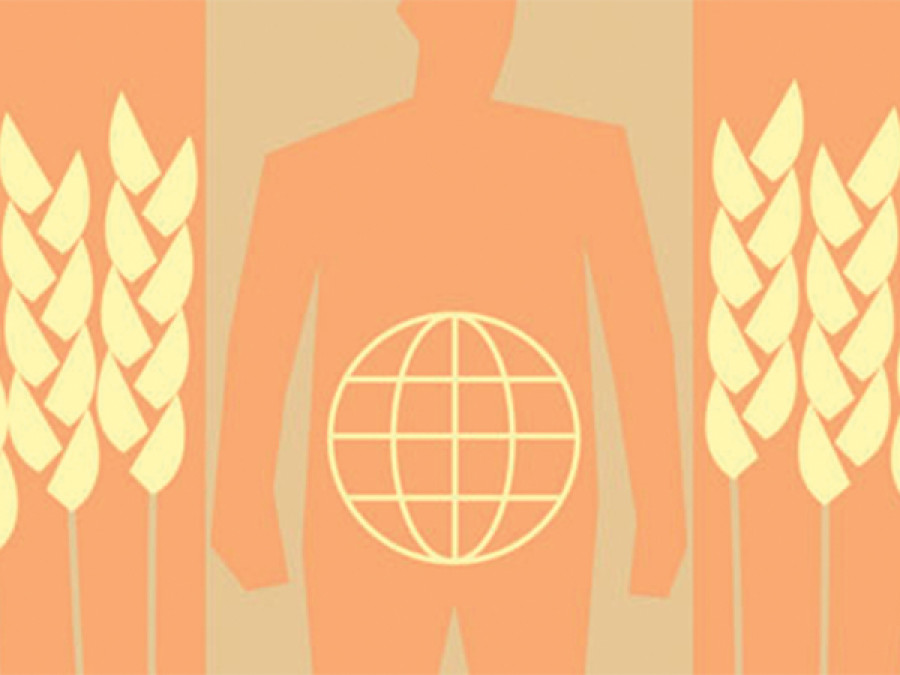Opinion
Fight against hunger
Ensuring food security means increasing accessibility too, not only boosting output
Prakash Budha Magar
The new constitution of Nepal, in continuation of the provision in the Interim Constitution 2007, ensures food security as a constitutional right. About 25 percent of the people in Nepal are currently living under poverty in Nepal and about 32 districts are considered to be food insecure. However, ensuring food security is a complicated and difficult endeavour. It is evident that lack of cooperation between different government departments and authorities, and lack of political determination has made it even more difficult to achieve such a goal. In addition, most of the government’s food security policies are production-led, which points to the need to understand farm production and food security differently.
Affordability as accessibility
The factors leading to hunger must be identified first in order to eradicate it. Various studies show that rural people are most susceptible to hunger even though they are the primary producers of food. The issue is accessibility, and it is the poor who are mostly vulnerable to food insecurity due to their inability to afford it. Another reason behind food insecurity is unavailability. Wars, natural calamities, dysfunctional markets and lack of human resources could lead to unavailability of food.
In any case, national production is pivotal in determining food availability. However, the biggest flaw in Nepal’s effort to be food secure is the sole focus on increasing food availability. Many agricultural policies focus on increasing productivity by using new technologies, crops and methods of production that cannot necessarily guarantee food security. Abundant production does not necessarily guarantee that there will be
enough food for all. It is as much a matter of affordability as accessibility. It is important to place food production at the heart of discussions on food security, but it should not be treated as the only remedy. Ensuring adequate food for the people demands a multidimensional approach.
Accessibility, affordability, availability and acceptability are four main broad frameworks within which experts seek solutions to the problem of food insecurity. Nepal imports food to compensate for its shortage in national production. Various UN World Food Programme reports have listed it as being highly vulnerable in terms of food insecurity. This shows that food availability is an insufficient condition for food security. Remittance has played the biggest role in ensuring food security for many rural people in Nepal. Likewise, people have become food secure due to non-farm livelihoods. This calls for policies that allow people to enhance their capabilities and incomes to be able to buy food in the market.
Influential organisations such as the US Agency for International Development have constantly been advocating for greater private sector involvement in food production and a gradual reduction in the government’s role in monitoring and regulating. But handing over food production completely to the business sector is problematic for various reasons. Its main motive is profit, therefore, it might be costly for marginalised, vulnerable and geographically-at-risk people. Even if the private sector takes over the responsibility, it should be the government’s job to ensure affordability and accessibility. It is also the prime responsibility of the state to make food accessible. This should be done though global trade, and food should be available in remote areas and during times of crisis or natural calamities.
Ending hunger
Nepal’s topography is one of the major hindrances to providing adequate food in remote areas. The government should develop infrastructure and markets to ensure accessibility, and it should take any step necessary to achieve it, even ask for foreign aid if needed. The present Indian blockade is an example of how Nepal has failed to make goods accessible through trade. Many INGOs and NGOs have been lauding the government’s role in making food accessible through various programmes such as cash for work, subsidised food and aid food. However, project-led food security programmes are short-lived, and could have adverse impacts in the long term. Some have even criticised it for creating negative dependency. Nepal is hugely dependent on imported food. The government has failed to implement policies that ensure affordability, so policies and acts must be revised effectively to regulate markets. Similarly, accessibility must be ensured by investing more in disaster preparedness.
The government has identified food security as a fundamental human right in the constitution, so food-related legislations and acts must be passed to ensure food security. International human rights laws oblige the government to take steps to respect, protect and fulfil the right to food. In doing so, the government has both negative and positive duties. Nepal has signed the International Convention on Economic, Social and Cultural Rights, so the government not only has the duty to fulfil the obligations, but also provide protection from third parties such as business corporations, markets, businessmen, international agencies and other countries. Legally binding food related acts are also necessary to deal with food security.
And even though privatisation is good for food production, its distribution must be the government’s responsibility. Emphasising production is excellent, but affordability and accessibility must be addressed side by side. The failure to act promptly during the recent earthquake clearly shows that the government does not have any emergency plans to deal with the food security. In addition, well- targeted social protection schemes must be formulated for the vulnerable and marginalised people during natural crises. Therefore, it is indeed heartening that the UN has vowed to eradicate hunger by 2030 and achieve the zero hunger Sustainable Development Goal.
Magar is food policy research committee coordinator at Global Youth Forum For Food, Agriculture & Land




 9.6°C Kathmandu
9.6°C Kathmandu










